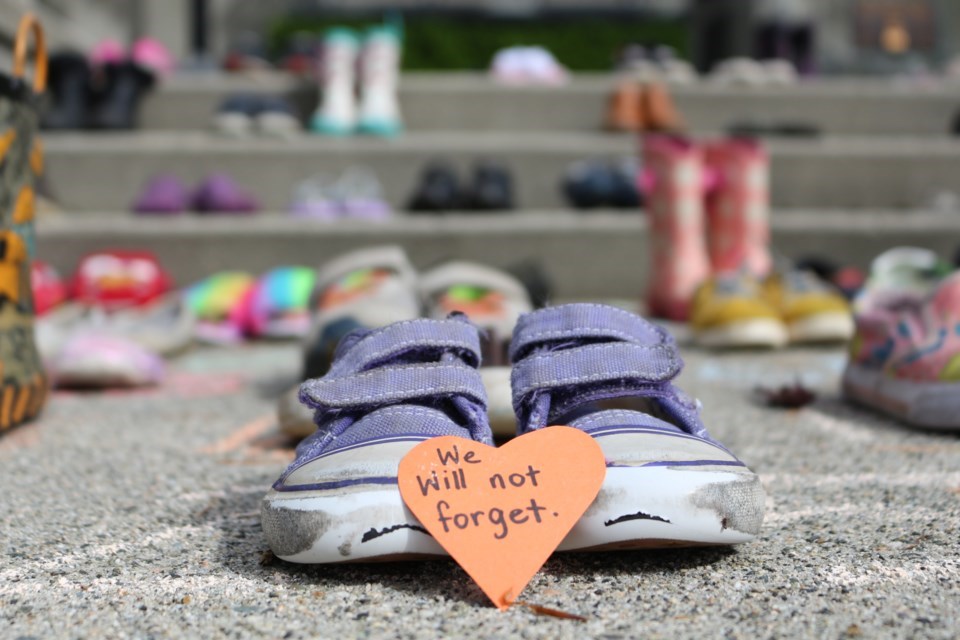New Westminster is poised to proclaim March 2023 to March 2024 as A Year of Truth.
Council has directed staff to prepare a proclamation for A Year of Truth and to make a presentation at a future council meeting to launch this initiative.
“A Year of Truth is an initiative that will connect both city staff and the community to the City of New Westminster’s truth and reconciliation journey by establishing that truth needs to come before reconciliation,” said a report to council. “Several opportunities to learn and reflect will be offered.”
According to the report, New Westminster’s reconciliation effort are motivated by a responsibility to recognize and to honour the deep original connections to this area by Halkomelem-speaking Nations, some of whom lived here along the banks of the Fraser River, and others who passed through by land or water to travel between the territories.
“New Westminster is also the birth place of colonization in British Columbia, as it was the colonial capital,” said the report. “The city acknowledges that its very existence was built upon the destruction of the land and river connections of the original inhabitants, and of their lives and livelihoods. Therefore, it is the city’s responsibility to correct the wrongs of our colonial history. To that end, New Westminster’s relationships with the First Nations of this land and with the urban Indigenous community is an ongoing strategic priority for the city.”
The report states that the city has been engaging with multiple First Nations since 2018 on a variety of issues, including seeking input around amendments to the official community plan, including First Nations representation on civic committees, having council-to-council meetings and mayor-to-chief meeting with several First Nations, and signing a sister community agreement with the Tsilhqot’in.
A number of staff-based education and learning opportunities have also been taking place, including monthly medicine wheel workshops and an elder-in-residence program.
Having laid the groundwork of education and relationship-building, the report said the next step that’s needed is to more clearly understand what truth and reconciliation means.
“These two terms must be separated in order to truly learn and understand what they mean,” said the report. “For this reason, staff are recommending that 2023 be acknowledged as ‘A Year of Truth’, with several actions that educate and acknowledge the truth of the harms of colonization and the Indian residential school system.”
This year will be A Year of Truth not The Year of Truth, said the report, as it may take several years to develop a deep enough understanding of the truth before reconciliation acts can be undertaken.
Christina Coolidge, the city’s Indigenous relations advisor, said one of the most common comments she receives from non-Indigenous community members is that they believe “in this thing called reconciliation” but they don't know how to do it.
“I think part of the reason why we don't know how to do it is we don't really know what we're doing it for and why we're doing it individually,” she said. “And I think that that's what the truth piece is.”
Truth must come before reconciliation, Coolidge told council.
“We're so quick to jump into reconciliation, but that makes it a little bit performative when we don't know why we're doing it,” she said. “So seeking the truth first makes that reconciliation really meaningful, because we know why we're doing it.”
Some of the actions being proposed for A Year of Truth include continued professional development for city staff, economic development actions (including the launch of a program for Indigenous-owned businesses), and initiatives in the library and heritage services departments.
There will also be opportunities for community participation through a number of initiatives, including the Truth Before Reconciliation contest that will take place in June (Indigenous History Month) and public art opportunities.
Council support
Coun. Nadine Nakagawa fully supports the initiative.
“I think it feels really right to have that truth,” she said. “As people have told me, truth comes before reconciliation. And we can't sweep the history and the truth under the rug if we want to move forward in a good way with reconciliation and decolonization.”
Nakagawa said the initiative will include art and public events, and will provide an opportunity to bring the community together.
“That's nothing but opportunity. And community building, I think, is really the intention here,” she said. “So I’m really looking forward to this and am very supportive of this work.”
In April 2018, New Westminster city council supported Nakagawa’s motion to endorse the Truth and Reconciliation Commission of Canada’s report, Honouring the Truth, as well as the commission’s 94 calls to action. The city also endorsed the United Nations Declaration on the Rights of Indigenous Peoples and indicated it would use the declaration as a framework for truth and reconciliation.
Mayor Patrick Johnstone said he’s looking forward to initiatives offered in A Year of Truth.
“It's going to be uncomfortable work at times in the community, but I think it's very valuable,” he said. “I think it's going to make us a stronger city for having done it. So I just appreciate this plan and I am looking forward to seeing it done.”
Coun. Ruby Campbell said she’d like A Year of Truth to include an opportunity for artwork related to this initiative to be placed inside New Westminster City Hall.
“I'd love to see some unique ways for us to really look at city hall, all over city hall, upstairs, downstairs as being a place that we curate, and maybe convey this message of the year,” she said.
Coolidge acknowledged the efforts of Jen Arbo, the city’s economic development coordinator, who worked on A Year of Truth planning. She noted that her City of New Westminster colleagues are “really committed” to work on truth and reconciliation.





